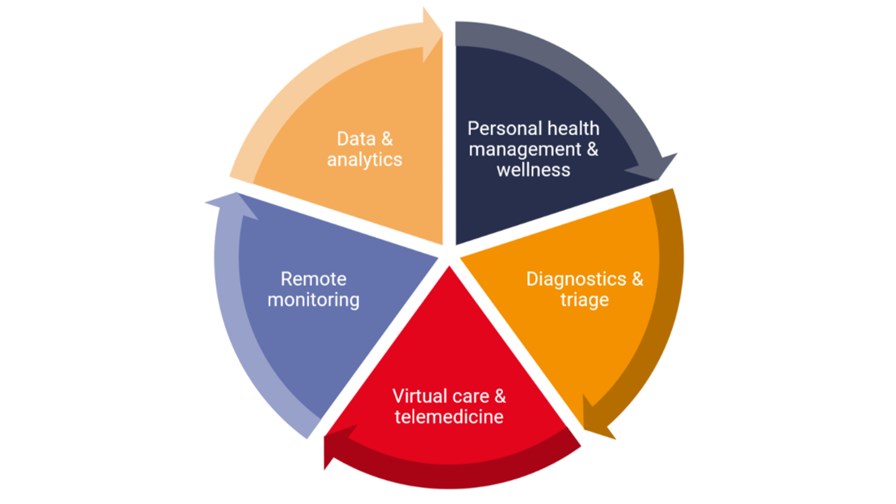
Source: STL Partners
- There’s nothing like a life or death scramble to get things moving
- According to London consultants STL, Covid-19 moved the digital health scene forward by about four years
- If telecom network operators are building new businesses ‘beyond connectivity’, it claims, they need to make some careful choices, and it believes digital healthcare is a natural vertical for operators to target since they have the skills and capabilities required for it
There’s no doubt that Covid-19 has been a terrible scourge, but it’s also stamped down on the accelerator for tech areas such as home broadband, collaboration services, cloud applications and services generally, along with remote working.
But what Covid did to the digital healthscape may have the most consequential of impacts. The pandemic forced the adoption of digital technology and communications where often before there was only tinkering and not necessarily by the large national healthcare providers, like the UK’s NHS. Covid may have broken that logjam as medical professionals had to adapt quickly, using telephone and online consultations, for instance, in place of patient walk-ins just to stay above water in the midst of the crisis. As a result in the UK the proportion of doctor’s visits happening over the phone or video rose from around 13% in late 2019 to 48% at the peak of the pandemic in April-June 2020. US based virtual consultation provider Teladoc saw total visits treble between Q219 and Q220, to 2.8 million.
STL says that barriers to adoption of virtual consultations were lowered as pandemic pressure built and other barriers, such as insurers or governments not reimbursing or underpaying doctors for virtual appointments, and organisational and culture barriers among both patients and providers also broke down and resulted in an acceleration across the broader digital health market, in areas such as remote patient monitoring and population level analytics.
The introduction of apps (badly executed)- in the UK in the guise of track & trace, was another wake-up call.
The Covid experience provided a crash course in the possibilities represented by IT building on steady progress already being made with digital health initiatives and systems pre Covid.
As a result, STL says many telcos “believe that healthcare is a vertical with significant opportunity, as demonstrated by operators’ such as TELUS and Telstra’s big investments into building health IT businesses, and smaller but ongoing efforts from many others.”
STL points out that Digital healthcare has a whole range of things going for it, including:
- Health care being a ‘consistently growing need’ in every country in the world.
- The sector is big enough in nearly every country to provide a meaningful revenue boost for digital healthcare providers, it calculates.
- The fact that health is always a national market means that telcos can get a look in because local knowledge and relationships are required to do well - qualities the global tech giants may not have.
- Healthcare tends to be a slow old business, bound by rules and regulations - something that telcos are used to dealing with.
However, up to now, says STL, many telcos have avoided putting their full effort into healthcare transformation.
Why?
STL says, having conducted many interviews on this matter, it’s come to the conclusion that it’s mostly “because they are not yet fully convinced that addressing the challenges associated with transforming healthcare – fragmented and complex systems, slow moving public processes, impact on human lives – will pay off. Are they capable of solving these challenges, and is the business opportunity big enough to justify the risk?” they ask themselves.
But now is the time to cast off the doubt, say the consultants
“Taking a cautious “wait and see” approach to developing a digital health business, launching a couple of trials or PoCs and seeing if they deliver value, or investing in a digital health start-up or two, may have been a viable approach for operators before the COVID pandemic hit, but with the acceleration in digital health adoption this is no longer the case. Now that COVID has forced healthcare providers and patients to embrace new technologies, the proof points and business cases the industry has been demanding have become a lot clearer. As a result, the digital health market is now four years ahead of where it was at the beginning of 2020, so operators seeking to build a business in healthcare should commit now while momentum and appetite for change is strong.
The information for this article came from STL Partners’ Executive Briefing Service, Growing Enterprise Revenues - The $300bn COVID digital health dividend. Click to get more information.
If we follow the What Katy Did trilogy, we have a couple of tempting follow-ups waiting in the wings. ‘What Covid Did Next’ is surely on standby and ‘What Covid Did at School’ is also bound to be a tempting plunder at some point.
Email Newsletters
Sign up to receive TelecomTV's top news and videos, plus exclusive subscriber-only content direct to your inbox.




